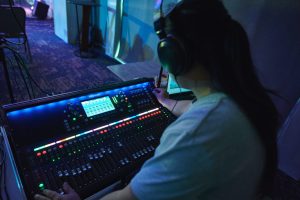 In film or any form of video, audio mixing is the process of combining different sounds and audio recording into a final sound that complements the images to tell a story. The audio is a very important part in a film or any other type of digital content like commercials, documentaries or even short form content for social media.
In film or any form of video, audio mixing is the process of combining different sounds and audio recording into a final sound that complements the images to tell a story. The audio is a very important part in a film or any other type of digital content like commercials, documentaries or even short form content for social media.
If you’re looking to hire an Audio Mixer in your company then please call us on 020 7580 7333 or email us on info@yellowcat.london.
What is an Audio Mixer?
The Audio Mixer, also known as dubbing mixer, is a post-production audio engineer in charge or mixing different sounds/audio elements like dialogue, sound effects, foley, atmosphere sounds and music. The goal of an Audio Mixer is to achieve a soundtrack that aligns with the director/client vision for the project.
Audio mixers must have an exceptional ear and creative mind to produce a piece that adds meaning to the images. They need to adjust the volume levels, pick the right music or sound effects that will connect with the audience; depending on the scene they will need music that can transmit tension, romanticism, suspense, horror or happiness to indicate the mood of a scene.
What are the key responsibilities of an Audio Mixer?
Some of the responsibilities of an Audio/Dubbing Mixer are:
• Assemble all the audio elements and make them sound good together in a natural way.
• Balance dialogue, background noise, music and sound effects that perfectly aligns with the images.
• Make creative decisions in each scene about how loud each major sound element (dialog, sound effects, laugh track and music) should be relative to each other.
• Use their work to enhance the storytelling of a project and exceed expectations with the final result.
• Choose the right sound effects and music and assign it to match each scene adding meaning to it.
• Ensuring the story is being correctly told through the sound mix they produce.
What skills and software does an Audio Mixer need?
• Great listening skills, having a good ear is what makes an Audio Mixer good at their job because they will be able to hear sounds differently than others.
• Comfortable using audio software such as Adobe Audition, Audacity, Ocenaudio and more.
• Ability to communicate well with others, Audio Mixers will need to understand the vision of the project and the director/client expectations.
• Attention to detail, looking carefully at every sound and identifying any mistakes.
• Being creative is essential to make a sound mix that tells a story and indicated the mood or emotions of each scene.
• Good knowledge of audio production, sound, and audio editing.
How do you become an Audio Mixer?
It’s very common for Audio Mixers to have a degree in audio production or engineering as they carry great responsibilities within the role. To become an Audio Mixer you will also need a considerable amount of experience in audio post-production.
A good start would be working as a sound designer assistant for example or as a runner. Making good connections and giving a good impression will also help you out when it comes to getting jobs that will allow you to grow and develop your skills. After you gain the right amount of experience and mastering the software used in audio mixing you will be ready to take on a role as an Audio Mixer.